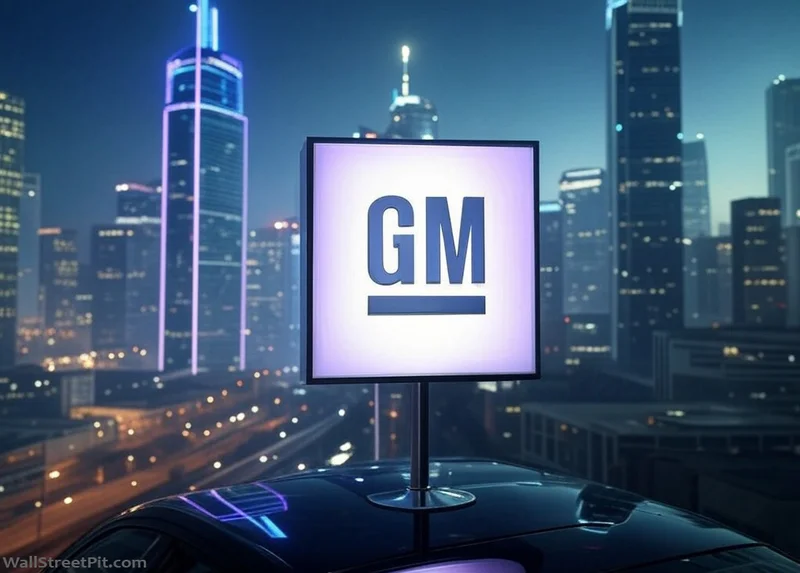Yesterday, something happened on the stock market that should make every single one of us sit up and pay attention. And no, I’m not talking about the usual dance of tech darlings like Nvidia stock or the latest chatter around the Tesla stock price. I’m talking about General Motors.
Yes, that General Motors. The hundred-year-old titan of American industry, a company many had written off as a lumbering giant from a bygone era. On Tuesday, October 21, 2025, GM stock didn’t just nudge upwards; it exploded by 15%. In a single day. While the rest of the market was treading water, GM put on a masterclass.
When I first saw that number flash across my screen, I honestly just sat back in my chair, speechless. My initial thought wasn't about quarterly earnings or profit margins. It was about the sheer, earth-shaking significance of the signal being sent. This wasn't just a good day for a car company. This was the opening bell for the next phase of our technological revolution—the phase where the old guard doesn't just learn the new rules, but starts rewriting them.
For years, the narrative has been simple: nimble, software-first companies like Tesla would inevitably disrupt and dismantle the legacy automakers. The future, we were told, belonged to Silicon Valley, not Detroit. But what if that story was too simple? What if the real revolution isn't about replacement, but about transformation?
On the surface, the reasons for GM’s surge seem straightforward (as detailed in reports like GM stock soars 15% as automaker raises guidance, beats Q3 earnings). They beat their third-quarter estimates and, crucially, lowered their forecast for tariff costs. But dig a little deeper, and the real story emerges. That tariff adjustment—in simpler terms, it means they figured out how to navigate the unbelievably complex global supply chain with more speed and agility than anyone on Wall Street gave them credit for—is a testament to a new kind of operational intelligence. It’s not just about building cars anymore; it’s about mastering a global data-driven logistics network.
But here’s the part that truly lit up my brain. In the very same breath, GM announced it was taking a staggering $1.6 billion loss tied to a "reevaluation of its electric vehicle strategy." Let that sink in. A company took a billion-dollar-plus hit, and the market rewarded it with a 15% surge. This is the kind of breakthrough that reminds me why I got into this field in the first place.

This isn't a contradiction; it's the entire point. The market wasn’t cheering for a flawless plan. It was cheering for the courage to admit a plan was flawed and pivot—hard. This reevaluation of their EV strategy isn't a failure, it's a breathtakingly expensive and public declaration that they're willing to learn and adapt in real-time—it means the feedback loop between market reality, regulatory change, and corporate strategy is now being measured in months, not decades.
What we're seeing is the evolution of corporate DNA. For a century, a company like GM was a battleship: immensely powerful, but slow to turn, charting its course years in advance. What Tuesday showed us is that the battleship is learning to move like a speedboat. It’s a paradigm shift. So, the question I can’t stop asking is this: If GM can do it, who else can? How many other industrial giants are quietly retooling their entire philosophy, preparing to shock the world?
This moment feels uncannily familiar. It reminds me of IBM in the 1980s. The world was moving to personal computers, and the consensus was that the age of the mainframe—IBM's kingdom—was over. The company was seen as a dinosaur. But IBM didn't die. It transformed. It leaned into services, software, and enterprise solutions, reinventing itself for a new era. It proved that legacy and scale, when combined with a genuine willingness to change, can be an unstoppable force.
What we’re witnessing with GM is the industrial equivalent. This is no longer a battle of electric versus gas. It’s a battle of integrated systems. The car is becoming a powerful, rolling computer, and the winner won’t be the company that builds the best engine or the sleekest body, but the one that seamlessly merges hardware, software, and user experience. The fight for the future of mobility isn’t just about GM stock price today versus the Ford stock price; it’s about who can become a true technology company first.
Of course, this kind of rapid, wrenching transformation isn’t without its human cost. The skills required to assemble a combustion engine are profoundly different from those needed to code a neural network or manage a battery's thermal properties. As we celebrate this industrial renaissance, we have a profound ethical responsibility to invest in the people—the engineers, the factory workers, the designers—who are at the heart of this change. A true revolution can't leave its people behind.
But the potential here is just staggering. Imagine a world where the manufacturing might of Detroit merges with the innovative spirit of Silicon Valley. Imagine a future where the companies that built our world for the last century become the architects of the next one. That’s the future that GM’s 15% surge hinted at. It’s a future that’s not just possible, but is starting to unfold right before our eyes.
Let’s be clear. The ticker symbol is just the beginning of the story. The real metric to watch isn’t the daily fluctuation of the Dow Jones or the price of gold; it's the speed of adaptation. What GM demonstrated is that the most valuable asset in the 21st-century economy isn’t a patent or a factory—it’s the organizational courage to make a billion-dollar bet on change. The sleeping giants are waking up, and the race to define our future just got a whole lot more interesting. This isn’t the end of an old story. It’s the explosive start of a new one.